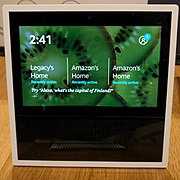Smart speaker
A smart speaker is a type of wireless speaker and voice command device with an integrated virtual assistant (artificial intelligence) that offers interactive actions and handsfree activation with the help of one "hot word" (or several "hot words"). Some smart speakers can also act as a smart device that utilizes Wi-Fi, Bluetooth and other wireless protocol standards to extend usage beyond audio playback, such as to control home automation devices. This can include, but is not be limited to, features such as compatibility across a number of services and platforms, peer-to-peer connection through mesh networking, virtual assistants, and others. Each can have its own designated interface and features in-house, usually launched or controlled via application or home automation software.[1] Some smart speakers also include a screen to show the user a visual response.
As of winter 2017, it is estimated by NPR and Edison Research that 39 million Americans (16% of the population over 18) own a smart speaker.[2]
Most popular smart speaker devices and platforms
| Virtual Assistant | Owned by | Devices | No. of users | Languages/Markets | Notes |
|---|---|---|---|---|---|
| Alice | Yandex | Yandex Station | Russia | Yandex Station went on sale in July 2018 | |
| AliGenie | Alibaba Group | China | Went on sale in August 2017 | ||
| Amazon Alexa | Amazon |
|
31 million Echo devices in U.S. (January 2018)[3] | (March 2018): English for US, UK, Ireland, Canada, India, Australia, New Zealand; German (Germany, Austria); Japanese (Japan); French (France) "coming soon"[4] | |
| Ambient OS | Essential Products | Essential Home (in development) | |||
| Apple Home Kit | Apple, Inc. | Invoxia Triby | |||
| Siri | Apple, Inc. | Apple HomePod | February 2018: English for US, UK, Australia[5] | ||
| DuerOS Open Platform[6] | Baidu | Xiaoyu, RavenH, Aladdin ceiling-mounted smart speaker-lamp-projector[7][8] | China | Xiaoyu went on sale in Spring 2017.[6] | |
| Clova | Naver Corporation, Line Corporation | Japanese and Korean for Japan and South Korea markets | Introduced Summer 2017[9] | ||
| Google Assistant | Google Home series: Home, Home Max, Home Mini | 14 million Google Homes in U.S. (January 2018)[3] | Languages March 2018: English (U.S., U.K., Canada, Australia), French (France, Canada), German, Japanese[10] | ||
| Beijing LingLong, part of JD | DingDong | Mandarin and Cantonese for Greater China | In cooperation with Chinese AI firm iFlytek. Went on sale November 2016.[11] | ||
| Microsoft Cortana | Microsoft | Harman Kardon INVOKE | English for US, Canada, Australia, India (January 2018)[12] | ||
| Xiaowei[6] | Tencent | forthcoming[6] | China | ||
| Bixby | Samsung Electronics | Galaxy Home | [13] |
Gallery
-
The first-generation Amazon Echo smart speaker in black
-
An Apple HomePod speaker
-
The Google Home smart speaker idle on a table
-
The Amazon Echo Show smart speaker in white
-
The Harman Kardon INVOKE smart speaker in graphite
References
- ^ smart speaker, techtarget.com, May 2017
- ^ The Smart Audio Report from NPR and Edison Research, Fall-Winter 2017 (PDF)
- ^ a b "New data: Google Home faring better against Amazon Echo, grabbing 40% of U.S. holiday sales". 26 January 2018.
- ^ "AVS for International". developer.amazon.com. Amazon. Retrieved 19 March 2018.
- ^ "You can finally buy Apple's HomePod". 9 February 2018.
- ^ a b c d Horwitz, Josh. "China's tech giants are racing to popularize their versions of the Amazon Echo".
- ^ "Baidu launches three new smart speakers that don't need Alexa or Google Assistant".
- ^ Bonnington, Christina (16 November 2017). "Baidu's New Smart Speaker Looks Like Nothing Else on the Market" – via Slate.
- ^ "LINE to Introduce Clova Virtual Assistant for Korea and Japan - Voicebot". www.voicebot.ai.
- ^ "Change your Google Assistant language". Google Home Help. Google. Retrieved 19 March 2018.
- ^ Bateman, Joshua D. (22 November 2016). "Behold China's Answer to Amazon Echo: The LingLong DingDong". Wired. Condé Nast. Retrieved 25 November 2017.
- ^ "The Harman Kardon Invoke with Cortana works just fine outside the U.S."
- ^ Ingraham, Nathan (9 August 2018). "Does Samsung's Galaxy Home stand a chance?". Engadget. Oath Inc. Retrieved 9 August 2018.





